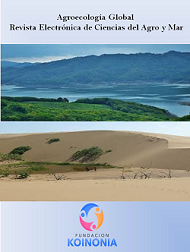Global climate change, looking from the theory of the social fields
DOI:
https://doi.org/10.35381/a.g.v1i1.498Keywords:
Climate change, Global warming, Pollution, Air pollution.Abstract
Unplanned progress and development bring with it a significant increase in Global Climate Change, where responsibility is intrinsic to the State and individual to each. The negative impact on the environment generates an environmental crisis, which threatens not only economic relations or any type, but even life itself on the planet. Methodologically, it is an interpretative hermeneutic investigation, with a qualitative approach and documentary design, through a bibliographical revision, texts and on-line documents of different authors to develop the pertinent analyzes, generating a process of interpretation and theorization of the observed reality. We studied the environmental crisis inscribed in a new historical social process, from Bourdieu's theory of social fields. The management of the environment has changed in structure and content, so another form of management has been established, which deserves to be debated and studied in its components, effects and consequences. Symbolic struggles and domination on the part of the power groups are mutually agreed upon, and common sense, a sense of the social, only makes the functioning of the structures of domination obvious. An exacerbated consumerism is induced that prevents to minimize the impact on the global warming, reason why it is necessary to generate the environmental citizenship to form the culture of the good use of the resources and services.
Downloads
References
Amestoy J. (2010). El Planeta tierra en peligro (Calentamiento Global, Cambio Climático, Soluciones). Editorial Club Universitario. Pg. 90. San Vicente, Alicante. España.
Ballesteros C., Carrero I., Ramos M., Saldaña D., Sierra L., Valor C., García C. (2010). Ciudadanía del consumo: hacia un consumo más responsable. Panorámica y Tendencias. Revista Documentación Social, ISSN 0417-8106, Nº 156, págs. 15-16.
Bourdieu P. (1990). In Other Words. Essays Towards a Reflexive Sociology. 1990, P.13, 88.
Bourdieu P. (1992). Reponses: pour une anthropologie réflexive. Paris: Ed. du Seuil.
Bourdieu P. (1997). “El nuevo capital”, en Razones Prácticas. Sobre la teoría de la acción. Anagrama, 1997, pág. 40.
Bourdieu P. (1997). Razones practica. Sobre la teoría social. P. 19.
Bourdieu P. (1999). Meditaciones Pascalianas, Ediciones Anagrama. 1999. pág. 29, 195, 217, 218,219, 220,221, 223, 224, 225, 230, 231, 236,237.
Bourdieu P. (2000). Cosas dichas. Gedisa. Barcelona, España.
Bourdieu P. (2000). Cuestiones de Sociología. Ed. Istmo S.A. Madrid, España.
Bourdieu P. y Wacquant L. (1995).Respuestas. Por una Antropología Reflexiva. Ed. Grijalbo. Pag. 83,87,88,120.
Crutzen, P. J., and Stoermer E. F. (2000). The “Anthropocene”. Global Change Newsletter. 41:12-13.
Duarte C., Alonso S. Benito G., Dachs J., Montes C., Pardo M., Ríos A., Simó R y Valladares F. (2006). Cambio global. Impacto de la actividad humana sobre el sistema Tierra. Consejo Superior De Investigaciones Científicas. Edición: Cyan, Proyectos y Producciones Editoriales, S.A. ISBN: 978-84-00-08452-3. España. Madrid.
Habermas, J. (199I). Teoría de la acción comunicativa. Tomo I. Ed. Taurus. Madrid, España.
Informe del Grupo Intergubernamental de Expertos Sobre el Cambio Climático. Grupo Intergubernamental de Expertos sobre el Cambio Climático©. Cambio Climático (2015). Informe de Síntesis. ISBN 978-92-9169-343-6.
Martínez H. y Guerrero G. (2009) Introducción a las Ciencias Sociales. Con Enfoque de Competencias. ISBN-13: 978-607-481-093-6. Cengage Learning Editores, S.A. Santa Fe, México.
Quesada F. (2004). Aproximación a la Metodología de la Ciencia: las Ciencias Sociales y la Contabilidad. 2004. Ediciones de la Universidad de Castilla, La Mancha. ISBN: 84-8427-321-0. España.
Ruiz A. (2009). Cambio climático, ¿un desafío a nuestro alcance?: XIII Jornadas Ambientales. Ediciones Universidad de Salamanca. ISBN 978-84-7800-273-3. Salamanca España.
Sidorovas L. (2015).Responsabilidad Social y Gestión Organizacional en la Universidad de Carabobo: Sincronismo Ineludible en Cambios Coyunturales. UPEL, Revista Dialógica. Junio 2015. Vol. 12, N° 1. . Página 1. http://revistas.upel.edu.ve/index.php/dialogica
Sidorovas L, (2010). Responsabilidad Social Individual Contaminación Ambiental y Predicción de Eventos Naturales. VII Congreso Nacional y I Congreso Internacional de Investigación “Investigación y Sostenibilidad de la Vida” Universidad de Carabobo, Valencia Venezuela.
Svante A. (1896). On the Influence of Carbonic Acid in the Air upon the Temperature of the Ground Philosophical Magazine and Journal of Science. Series 5, Volume 41, April 1896, pages 237-276.
Published
How to Cite
Issue
Section
License
CC BY-NC-SA : Esta licencia permite a los reutilizadores distribuir, remezclar, adaptar y construir sobre el material en cualquier medio o formato solo con fines no comerciales, y solo siempre y cuando se dé la atribución al creador. Si remezcla, adapta o construye sobre el material, debe licenciar el material modificado bajo términos idénticos.
OAI-PMH URL: https://fundacionkoinonia.com.ve/ojs/index.php/agroecologiaglobal/oai





.png)


